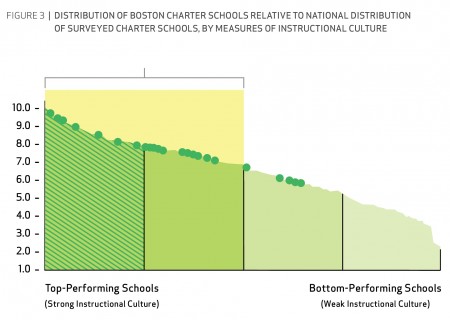In 2013, the Boston charter school sector received significant attention for its strong academic performance after the release of two important studies. A CREDO study found that students in Boston charter schools gain an additional 12 months of learning in reading and 13 months of learning in math than their district school peers. These findings were reinforced by a study from MIT, supported by NewSchools, which documented that charter students are outperforming their district peers.
These impressive findings on the quality of the charter sector in Boston led to interest in the practices that drive these great outcomes. What makes these schools so effective? In order to help address that question, NewSchools supported TNTP to investigate how school leadership practices in Boston charter schools create environments that drive high-quality teaching.
TNTP has developed a survey tool called Instructional Culture Insight, which measures teachers’ perceptions of their school environments. TNTP has found that schools with strong instructional cultures – schools they have termed Greenhouse Schools – are associated with higher academic results. TNTP published a report examining the practices that contribute to strong cultures in a paper called “Greenhouse Schools: How Schools Can Build Cultures Where Teachers and Students Thrive” in 2012.
Today, TNTP is publishing a new paper, “Greenhouse Schools in Boston: School Leadership Practices Across a High-Performing Charter Sector,” that finds incredibly strong instructional cultures in the Boston charter school sector. Compared to other charter schools across the country that have participated in the Insight survey, Boston’s charter sector shines: A majority of the surveyed Boston charter schools (18 of 23) are in the top half of all charter schools that participate in this survey nationally, and all the participating Boston charters are in the top two-thirds.
The data suggest that the Boston charter school sector has created environments that are great places for teachers to work. When asked if their school is a good place to teach and learn, 78 percent of teachers across all the participating Boston schools agree—an agreement rate that’s comparable to just the top-performing charter schools (in terms of instructional culture) nationwide.
TNTP has identified four key practices that help create these strong instructional cultures in Boston charter schools:
1. Consistent learning environments that enable a focus on student growth: Boston charter schools have high and consistent expectations for student learning, with 84% of surveyed Boston teachers agreeing that their school implements a rigorous curriculum, compared to 67% of teachers at charter schools nationally, and they regularly measure student progress to maximize outcomes. Rebecca Cass, Managing Director of Programming for Excel Academy Charter Schools, a NewSchools portfolio member, explains: “Our systems and structure, coupled with high expectations and quality teaching, are the key levers for getting strong results for students.”
2. Teacher development through observation, feedback, and peer modeling: In the surveyed Boston schools, school leaders provide instructional leadership by frequently observing teacher practice and providing actionable feedback to drive continuous improvement in teacher practice. Compared to their peers nationally, the Boston charter school teachers surveyed have more frequent touch points with their school leaders—a median of 18 observations throughout the year, compared to 11 elsewhere. Nearly three-quarters of surveyed Boston teachers say that feedback from observations helps them improve student outcomes. Kimberly Steadman, the co-Director of Academics at Brooke Charter Schools, a NewSchools portfolio member, explains Brooke’s investment in continuous teacher development: “We think teaching is really hard. No one will ever say, ‘I have learned everything there is to learn about teaching.’ We think that learning needs to happen on the job.”
3. Early hiring with a high bar: Nearly three-quarters of newly hired Boston teachers in the participating charter schools received their offers by June 1, compared to only about 50 percent in the top charter schools nationally. And the hiring process at these charter schools usually involves having candidates teach a sample lesson and spend time interacting with current teaching staff at the school, to provide a clear picture of the candidate’s strengths and to give the candidate a clear sense of the school and its potential to be a good fit.
4. The right responses to good (and bad) performance: TNTP has conducted research that finds that teachers are more likely to stay in schools where there are high expectations for all teachers. As TNTP puts it, “Great teachers want to work in schools with other great teachers.” TNTP found that Boston charter schools prioritize retaining their best-performing teachers and developing these star instructors for leadership positions, clearly signaling to all teachers the importance of high-quality instruction.
The Boston charter sector has focused on core instructional leadership practices that promote quality teaching and create environments that are great places for teachers to work, leading to schools where students excel. We think that these practices play a role in the academic success of the Boston charter school sector, and we encourage other schools to adopt these compelling practices.
